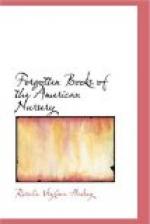“The Sister’s Gift” presents an opposite picture. In this case it is Master Courtley who, a “youth of Folly and Idleness,” received large doses of advice from his sister. This counsel was so efficient with Billy’s sensitive nature that before the story ends, “he wept bitterly, and declared to his sister that she had painted the enormity of his vices in such striking colors, that they shocked him in the greatest degree; and promised ever after to be as remarkable for generosity, compassion and every other virtue as he had hitherto been for cruelty, forwardness and ill-nature.” Virtue in this instance was its own reward, as Billy received no gift in recognition of his changed habits.
To the modern lover of children such tales seem strangely ill-suited to the childish mind, losing, as they do, all tenderness in the effort of the authors (so often confided to parents in the preface) “to express their sentiments with propriety.” Such criticism of the style and matter of these early attempts to write for little people was probably not made by either infant or adult readers of that old-time public. The children read what was placed before them as intellectual food, plain and sweetened, as unconcernedly as they ate the food upon their plates at meal-time. That their own language was the formal one of the period is shown by such letters as the following one from Mary Wilder, who had just read “The Mother’s Gift:”
Lancaster, October 9th, 1789.
HOND. MADM:
Your goodness to me I cannot express. My mind is continually crowded with your kindness. If your goodness could be rewarded, I hope God will repay you. If you remember, some time ago I read a story in “The Mother’s Gift,” but I hope I shall never resemble Miss Gonson. O Dear! What a thing it is to disobey one’s parents. I have one of the best Masters. He gave me a sheet of paper this morning. I hope Uncle Flagg will come up. I am quite tired of looking for Betsy, but I hope she will come. When school is done keeping, I shall come to Sudbury. What a fine book Mrs. Chapone’s Letters is: My time grows short and I must make my letter short.
Your dutiful daughter,
P.W.
Nursery rhymes and jingles of these present days have all descended from song-books of the eighteenth century, entitled “Little Robin Red Breast,” “A Poetical Description of Song Birds,” “Tommy Thumb’s Song-Book,” and the famous “Melodies of Mother Goose,” whose name is happily not yet relegated to the days of long ago. Two extracts from the “Poetical Description of Song Birds” will be sufficient to show how foreign to the birds familiar to American children were the descriptions:
THE BULLFINCH
This lovely bird is charming
to the sight:
The back is glossy blue, the
belly white,
A jetty black shines on his
neck and head;
His breast is flaming with
a beauteous red.




